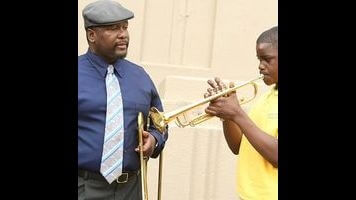Watching Khandi Alexander on Treme is the closest I’ve ever coming to understanding what it is that the rest of the planet finds so fascinating about Marilyn Monroe. It’s not a comparison that would have come to mind earlier in the series, but as Treme winds down, Alexander’s LaDonna is having more and more scenes in which she comes across as kittenish, her voice seeming to waft in from some distant shore, like a Tennessee Williams heroine signaling that she’s caught in a time warp between the present and the moment in her past where she’s chosen to set up permanent shop. I don’t remember anything like this in Alexander’s previous performances; it must be something she came up with for this role, or something that this role pulled out of her. (She’s allowed some of it to carry over into her role on Scandal, though there, the fragile-seeming, whispery line readings are the protective coloration used by a woman who is keeping her true face hidden, even from the daughter who may be the only person she loves.)
The LaDonna we’re used to seeing—the beautiful woman who’s mostly hard edges—still shows, most conspicuously in a scene with her mother, who asks her point-blank whether she’s planning to divorce her husband, and who doesn’t see LaDonna’s honest answer that she truly doesn’t know as reason enough not to ask if she’s liable to marry the new man in her life, Big Chief Albert. All LaDonna can say to that one is that “He’s very ill.” When she and Larry have a scene together—she casually drops by the house, hoping to talk, but the kids aren’t there, and Larry has “company”—it’s evident that going with the flow for a while might be a way for a woman who’s been primed for a fight her whole life to give herself some peace.
And when she’s with Albert, who just wants the gift of one more Mardi Gras, you can see that she might feel she has to make adjustments for them to be together, for as long as they can. Both of them have always been constitutionally incapable of giving an inch, and he’s hardly in a position now to be learning new tricks. She finds him at his table at home, preparing his Carnival finery and asks, “Need any help?” “I do not,” he snaps, and then, just as she’s wondering if this is worth it, he rolls out the red carpet: “But if you got nothing better to do…” Both characters are case studies in learning to find the right balance between having enough pride to stay alive and not being so proud that it kills you.
For Annie, pride continues to be what may keep her an artist, and what may kill her chances of ever reaching a larger audience. Having tempted her to sell out by recording her with “outside” musicians, Marvin the Manager now insults her by sending one of his younger minions to talk with her in his stead. I understand why the camera keeps following Annie around—she has a terrific instinct for which clubs seem to be serving up the wildest live performances—but her storyline is stalling out along with her career, and I’ve reached the point where I miss her ex-boyfriend, who used to be a drag on the action but who got more interesting once he curbed his drug habit and discovered both the limits of his musical talent and honest labor. The rehabilitation of his character—his becoming a likely springboard for interesting drama, I mean, not his moral improvement—is one of the show’s most remarkable triumphs, though the show has barely seemed to notice it.
Antoine is involved in a subplot that has much more fun with the whole “authenticity” angle. He’s hired by a movie company to teach an actor who’s playing a fictionalized version of Kid Ory to fake playing the trombone. The actor turns out to be an eager, lily-white dude who explains that it's okay for him to be playing Ory, since Ory was a Creole. He is apparently under the impression that the term “Creole” signifies a Coleman Silk type who is technically black but passes easily for white, and he is mightily disheartened when Antoine tells him, yeah, Ory was Creole, and so am I. For his part, Antoine is disheartened to learn that he has only a few hours to teach this sweetheart how to convincingly mime working his instrument to a difficult number. He works his ass off on the assignment, only to hear someone say, after the scene has been shot, “Don’t worry, we’ll fix it in post.” Treme is about what it means to care about earning your chops and getting it right in a “fix it in post” world.
Stray observations:
- Davis’ booth at WWOZ, with the room dark and lights strung across the walls for the holidays while King Curtis plays “What Are You Doing New Year’s Eve?”, is a pretty fair stab at representing Heaven on Earth, on a budget.
- Annie runs into a masked Eliabeth Ashley at a Twelfth Night party and says hello. Liz wonders how Annie recognized her. Annie takes the Understatement Of The Week Award for her explanation: “Maybe it was the voice?”
- After considerable signaling that it was inevitable, Janette and Davis finally land back in bed together. (“Treme’-vu!” she whistles, upon waking up.) Davis, who couldn’t go with the flow if he were caught in a whirlpool, asks her if there’s something going on between them. “Do we have to figure it out today?” If someone could figure out a way to put that scene on a T-shirt and sell it in the French Quarter, they’d be able to retire before they were 50.


 Keep scrolling for more great stories.
Keep scrolling for more great stories.